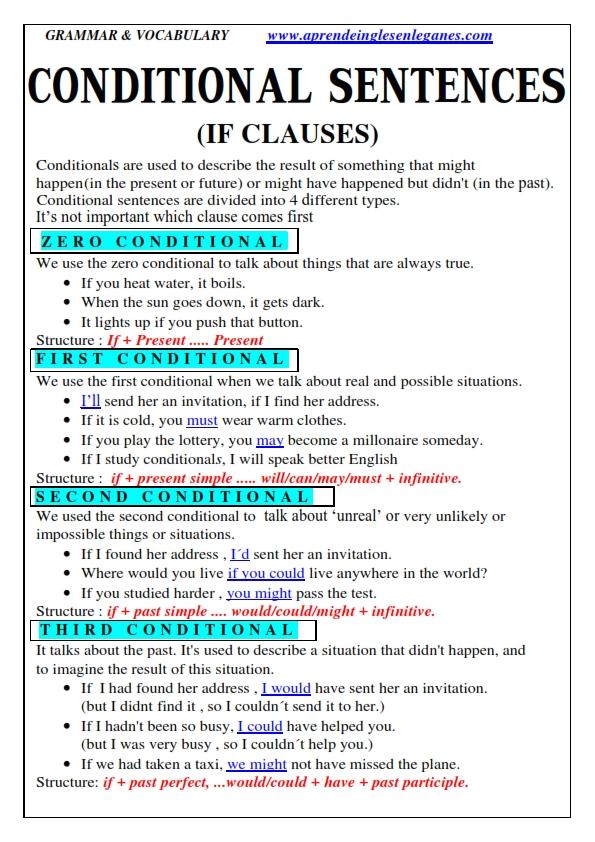Conditionals - exercises; Conditional sentences I-II; Conditional sentences - I-II-III; If clauses - all types; Conditionals - practice 1; Conditionals - practice 2; If clauses - all types; Conditionals multiple-choice; If sentences - exercise 1; If sentences - exercise 2; If sentences - exercise 3; If clauses - conditionals; Mixed conditionals quiz 2. There are four kinds of sentences: simple, compound, complex, and compound-complex. When using all four sentence types, you will be using sentence variety that makes your writing more interesting. SIMPLE SENTENCE The simple sentence has one independent clause. The following sentence contains a subject.
An adverb clause (also known as an adverbial clause) is a dependent clause used as an adverb within a sentence. These types of clauses can modify the whole sentence, as well as verbs, adverbs, and adjectives, and may show aspects such as time, reason, concession, or condition. These clauses often start with words such as (while, if, because, when, although, unless, since, so that, whereas, even if, in case, as long as) and other words.
In contrast, an adjectival clause will modify a noun and start with a relative pronoun (that, who, whose, whom, or which) or a subordinate conjunction (whenandwhere).
Before doing these exercises, you may find it helpful to review the study sheet 'Building Sentences With Adverb Clauses.'
Practice Identifying Adverb Clauses
Each of these proverbial sayings contains an adverb clause. Identify the adverb clause in each sentence, and then compare your answers with those below.
- While the cat's away, the mice will play.
- A lie travels around the world while truth is putting her boots on.
- If you don't know where you are going, any road will get you there.
- Memory is deceptive because it is colored by today's events.
- Never look down on anybody unless you're helping him up.
- You have to kiss a lot of toads before you find a handsome prince.
- Whenever you find yourself on the side of the majority, it is time to pause and reflect.
- Life is what happens when you are making other plans.
- As soon as you forbid something, you make it extraordinarily appealing.
- Everything is funny, as long as it's happening to somebody else.
- Don’t count your chickens before they hatch.
- If you want something done right, you have to do it yourself.
- When the going gets tough, the tough get going.
- When in Rome, do as the Romans do.
- Cowards die many times before their death.
- Don't cross the bridge till you come to it.
- Don't put the cart before the horse.


Answer Key
If Clause Type 1 Exercises
In the following sentences, the adverb clauses are in bold print. Examine what word or phrase they're modifying and what aspect they show (time, reason, concession, or condition). For example, in sentence 1, the clause refers to the time that the mice will play.
If Clause Type 1 Sentences
- While the cat's away, the mice will play.
- A lie travels around the world while truth is putting her boots on.
- If you don't know where you are going, any road will get you there.
- Memory is deceptive because it is colored by today's events.
- Never look down on anybody unless you're helping him up.
- You have to kiss a lot of toads before you find a handsome prince.
- Whenever you find yourself on the side of the majority, it is time to pause and reflect.
- Life is what happens when you are making other plans.
- As soon as you forbid something, you make it extraordinarily appealing.
- Everything is funny, as long as it's happening to somebody else.
- Don’t count your chickens before they hatch.
- If you want something done right, you have to do it yourself.
- When the going gets tough, the tough get going.
- When in Rome, do as the Romans do.
- Cowards die many times before their death.
- Don't cross the bridge till you come to it.
- Don't put the cart before the horse.